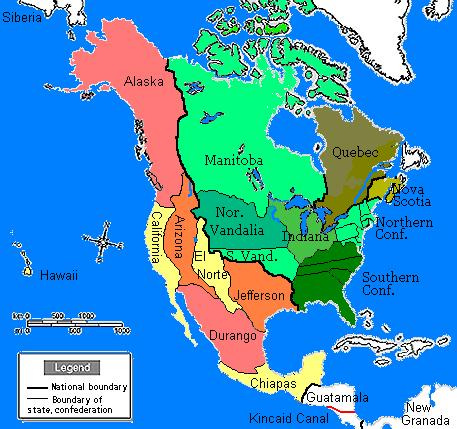☞ Alternate Histories and Societal Complexity

An Alternate North America.
I don’t know if this is something that happens to others, but in times of uncertainty and tumult, I find refuge in alternate histories. It’s a balm to imagine What If: what if things were different in the world that I live in, for good and for bad? How could small changes lead to divergent outcomes, ones that add up over time?
Unsurprisingly, this is one of those moments that calls for some alternate history. So, as part of my consumption, I happily absorbed the first season of the series For All Mankind, a television show that imagines the Space Race if the Soviets had landed a man on the moon first (the first words on the moon: “I take this step for my country, for my people, and for the Marxist-Leninist way of life. Knowing that today is but one small step on a journey that someday will take us all to the stars.”) Would the world be better or worse? Or simply different? It’s not entirely clear.
I also enjoyed the book For Want of a Nail. Subtitled “If Burgoyne Had Won at Saratoga,” this is one weird artifact. More worthy of a perusal than a careful cover-to-cover-read, it’s written in the style of a Twentieth Century textbook and replete with extensive footnotes. Beginning with the period before the American Revolution, it elaborates what might have happened if the rebellion had failed (one outcome: Thomas Jefferson is executed). And like other alternate histories, it shows a world that is both similar and different to our own. From Wikipedia:
North America is divided between two nations: the Confederation of North America (CNA), a union of British colonies that remains nominally associated with the United British Empire, and the United States of Mexico (USM), a bilingual nation resulting from an influx of expatriate American rebels to Colonial Mexico. Other major powers include the United British Empire itself; the German Empire, which dominates much of Europe and the Middle East; the Japanese Empire, which dominates eastern Asia; and Kramer Associates (KA), a vast global corporation that arose in the USM but is now based in Taiwan. All of the powers are engaged in a nuclear arms race that was initiated by Kramer Associates' detonation of an atomic bomb in 1962.
This is clearly distinct from our own history, yet technological and social changes have still caused certain similarities, such as a world war that begins in the late 1930’s. Reading what is essentially a scholarly tome from an alternate universe is certainly intriguing.
To be clear, these stories are not simulations of an alternate world. If we were to run rigorous computational simulations of “what-if” scenarios, we hope for predictive power, or at least some insight into the impact of changes that we might make. But when we tell stories, we only have to adhere to one criterion: it has to feel “right.”
Within that rightness is not accuracy, but realism, interestingness, and a willingness to recognize the complexity of human society. And perhaps that is the takeaway of all serious alternate history: that the world is complex. Any worthy alternate history must acknowledge the true nonlinear complexity of our society. Small changes make big differences, but large changes can also sometimes make almost no difference whatsoever. And that’s what makes them feel right. History rhymes, and so do parallel histories.
And with that, I leave you with a whole host of maps of alternate histories (and even more here).
Here are a few links of interest:
SETI and Democracy: some survey results from the UK on how people would like us to respond (or not) to any messages from intelligent extraterrestrials.
A history of Simulmatics: data science from the 1960’s (via Johan Ugander)
I’d also like to highlight two new books by my friends:
Kate Greene’s Once Upon a Time I Lived on Mars: A series of thought-provoking essays about Kate’s several months on a simulated Mars mission. It touches on life, space travel, solitude, and so much more.
Morgan Housel’s The Psychology of Money: A collection of lessons on how to think about investing and wealth, it is chock full of wisdom and a delight to read.
Until next time.


